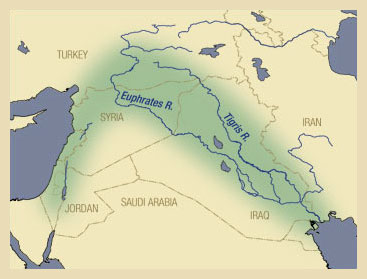Fertile Crescent?

Iraq and Syria have been described as the pillars of the Arab Fertile Crescent. Both countries, however, are in a state of intractable conflict and instability.
In Iraq, the sectarian and ethnic divide, which can be traced back to the American occupation, remains the principal obstacle preventing national unity.
Reconciliation becomes less possible every day, as there are daily bombings, even of ministries of government, and attacks on Falluja and the Anbar district in particular – not to mention the regular destruction of civilian quarters in Baghdad.
This sectarianism cannot be allowed to continue. While political forces seek to bring about national unity, the challenges remain unaddressed in a manner that promises rapid solutions.
Similarly, with the deadlock between the Syrian government and its opposition at the Geneva II conference a few days ago, the continuation of conflict in Syria is inevitable.
The United Nations and other humanitarian organizations were dismayed that the conference failed to open humanitarian aid corridors and establish local ceasefires in Aleppo and other cities and towns, especially Homs.
Valerie Amos, the UN Under-Secretary-General for Humanitarian Affairs, stated that “while the discussions continue to try and find a political solution to end the crisis, ordinary men, women and children are dying needlessly across the country and others are desperate for want of food, clean water or medical care. … The situation is totally unacceptable.”
After three years of violent confrontation, during which more than 100,000 people have been killed and millions have been displaced, the polarization in Syria has produced an incredible deadlock. The failure of the meeting in Geneva last month shows that the international community, especially the United States and Russia, is unable to quickly bring an end to this tragedy.
As Lakhdar Brahimi, the UN Special Envoy to Syria, noted on Friday, the Syrian government and its opposition have agreed that the basis for the next round of talks – scheduled for February 10 – will be the Geneva I communiqué sponsored by the United States and Russia, which outlines the need for a transition of power in Syria.
While it isn’t rational to predict a breakthrough on February 10, it is expected that the United States and Russia will have a better understanding of the outcome they seek.
As pillars of the Fertile Crescent, Iraq and Syria have always provided Arab culture with the best of art, poetry, and literature, and have shown the Arab yearning for unity, democracy, and development. The Arab people yearn for the day when such a description is once again validated and credible.
– written by Clovis Maksoud, provided to BBJ by The Mark News
Clovis Maksoud is a former ambassador and permanent observer of the League of Arab States at the United Nations (1979-1990), and its chief representative in the United States for more than 10 years.
SUPPORT THE BUDAPEST BUSINESS JOURNAL
Producing journalism that is worthy of the name is a costly business. For 27 years, the publishers, editors and reporters of the Budapest Business Journal have striven to bring you business news that works, information that you can trust, that is factual, accurate and presented without fear or favor.
Newspaper organizations across the globe have struggled to find a business model that allows them to continue to excel, without compromising their ability to perform. Most recently, some have experimented with the idea of involving their most important stakeholders, their readers.
We would like to offer that same opportunity to our readers. We would like to invite you to help us deliver the quality business journalism you require. Hit our Support the BBJ button and you can choose the how much and how often you send us your contributions.








